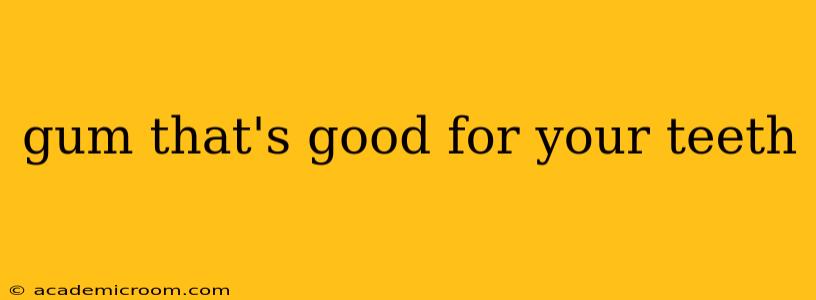Chewing gum has long been associated with fresh breath and a clean feeling, but can it actually be good for your teeth? The answer is a nuanced yes – but only under specific circumstances. Not all chewing gum is created equal, and understanding the science behind its oral health benefits is crucial. This article will delve into the specifics, separating fact from fiction and helping you choose the right gum for a healthier smile.
What Makes Gum Good for Your Teeth?
The primary benefit of chewing gum for your teeth lies in its ability to stimulate saliva production. Saliva is your mouth's natural defense system, neutralizing acids produced by bacteria, remineralizing enamel, and washing away food particles. Increased saliva flow helps buffer the acidic environment in your mouth, preventing enamel erosion and reducing the risk of cavities.
However, it's crucial to remember that not all gums are created equal. Sugar-laden gums counteract any potential benefits, leading to increased plaque buildup and potentially cavities. The key is to choose sugar-free gum that contains xylitol.
Does Xylitol Gum Really Help?
Yes, xylitol gum offers a significant advantage. Xylitol is a natural sweetener that inhibits the growth of Streptococcus mutans, the bacteria primarily responsible for tooth decay. Studies have shown that consistent chewing of xylitol gum can significantly reduce the incidence of cavities. However, it's not a magic bullet. Xylitol gum should be considered a supplementary tool in a comprehensive oral hygiene routine, not a replacement for brushing and flossing.
What About Gum With Other Sweeteners?
While xylitol is the preferred sweetener for oral health, other sugar-free options exist. However, be cautious. Some artificial sweeteners may have their own potential side effects, although research on their impact on oral health is ongoing. Always check the ingredient list and opt for gums with minimal added ingredients.
How Often Should I Chew Sugar-Free Gum?
While chewing sugar-free gum can be beneficial, moderation is key. The American Dental Association (ADA) recommends chewing sugar-free gum for 20 minutes after meals, but not excessively throughout the day. Excessive chewing can lead to jaw pain or damage. Remember, gum is a supplement, not a replacement for proper brushing and flossing.
Can Chewing Gum Whiten Teeth?
Some gums market themselves as teeth whitening agents. While chewing gum can help remove surface stains by increasing saliva flow, it is not a substitute for professional teeth whitening. The effect is minimal and won't significantly alter the shade of your teeth.
Is Chewing Gum Bad For Your Jaw?
Excessive chewing can strain your jaw muscles, potentially leading to temporomandibular joint (TMJ) disorders. Chew gently and avoid excessive chewing for prolonged periods. If you experience jaw pain, discontinue chewing gum and consult a dentist.
Can Chewing Gum Damage My Fillings?
Chewing gum itself is unlikely to damage fillings. However, if you have existing dental issues like loose fillings or cracked teeth, the force of chewing can exacerbate the problem. If you have concerns, consult your dentist.
Conclusion: A Healthy Addition, Not a Replacement
Sugar-free gum containing xylitol can be a valuable addition to your oral hygiene routine. It helps stimulate saliva production, which aids in neutralizing acids and remineralizing enamel. However, it's crucial to remember that gum is a supplementary tool, not a replacement for regular brushing, flossing, and regular dental checkups. Choose wisely, chew moderately, and maintain a comprehensive oral health strategy for a truly healthy smile.
